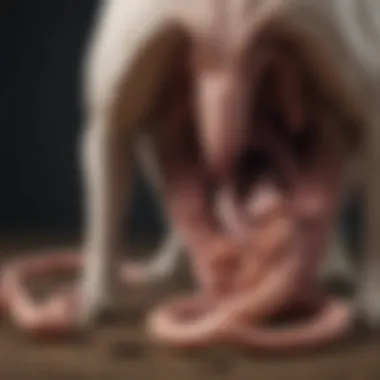Insightful Guide on Managing Soft Stool in Dogs for Optimal Digestive Health


Pet Care Essentials
Soft stool in dogs is often a distressing concern for pet owners, signaling potential underlying issues that need attention. Addressing this delicate matter requires a thorough understanding of various factors that can contribute to digestive disturbances in our canine companions. From monitoring daily nutrition requirements to recognizing signs of discomfort in our pets, navigating the realm of pet care essentials becomes essential.
When it comes to daily nutrition requirements, ensuring that our furry friends receive a balanced diet is paramount. Paying attention to not only the quality but also the quantity of food intake plays a vital role in maintaining their digestive health. It's crucial to incorporate high-quality proteins, essential vitamins, and minerals in their meals to support optimal gut function and overall well-being.
Exercise and playtime are integral components of a dog’s daily routine, contributing not only to their physical health but also to their digestive system. Regular exercise helps in keeping their bowel movements regular and promoting healthy digestion. Engaging in stimulating play sessions not only strengthens the bond between pet and owner but also encourages proper gut motility, reducing the likelihood of digestive issues.
Grooming tips extend beyond keeping our canine companions looking their best; they also play a role in maintaining their overall health and cleanliness. Regular grooming sessions help in identifying any skin issues or parasites that could be affecting their digestive system. Additionally, keeping their coat free from tangles and matting minimizes the ingestion of hair, reducing the risk of gastrointestinal disturbances.
Health and wellness check-ins are crucial in monitoring our dog’s overall health and detecting any potential concerns early on. Regular visits to the veterinarian allow for preventive care measures to be implemented, reducing the chances of encountering severe digestive issues. Through routine check-ups and recommended screenings, pet owners can stay proactive in safeguarding their furry friend’s digestive well-being.
Introduction
Soft stool in dogs is a common concern among pet owners, often signaling underlying issues that require attention and care. Understanding the causes and implications of soft stool is crucial for ensuring the well-being of our canine companions. In this comprehensive guide, we delve deep into the various aspects of soft stool in dogs, shedding light on the definition, causes, symptoms, impact on health, diagnostic approaches, management strategies, and preventive measures. By exploring these key elements, we equip pet owners with the knowledge needed to address soft stool effectively and enhance their dog's digestive health.
Soft stool, also known as loose stool or diarrhea, can result from a myriad of factors ranging from dietary choices to bacterial infections and food allergies. While occasional soft stool may not be alarming, persistent issues can indicate an underlying health concern that necessitates prompt attention. By recognizing the signs early and taking proactive measures, pet owners can ensure their furry friends lead a healthy and comfortable life. This article aims to provide valuable insights into soft stool in dogs, empowering readers to make informed decisions regarding their pet's digestive well-being.
Furthermore, by understanding the importance of identifying and addressing soft stool, pet owners can establish a strong bond with their dogs based on care and attentiveness. A healthy digestive system is integral to a dog's overall health and vitality, underscoring the significance of proactive measures and informed management strategies. Through this article, readers will gain a deeper appreciation for the intricacies of canine health, paving the way for a more fulfilling and enriching bond with their beloved pets.
Understanding Soft Stool in Dogs
Soft stool in dogs is a critical issue that requires attention and understanding for pet owners. Recognizing the signs and causes of soft stool can significantly impact a dog's overall health and well-being. This article aims to delve deep into this matter, shedding light on various aspects that contribute to soft stool in dogs. By gaining a comprehensive understanding of soft stool, pet owners can effectively address and manage this condition, ensuring the optimal digestive health of their canine companions.
Definition of Soft Stool


Soft stool in dogs refers to feces that are less formed and firmer than normal. When a dog regularly passes soft stool, it may indicate an underlying issue affecting its digestive system. Factors such as diet, hydration, and overall health play a crucial role in stool consistency. Understanding the characteristics of soft stool is essential for pet owners to identify when their dog may be experiencing digestive distress.
Causes of Soft Stool in Dogs
- Dietary Factors
Dietary Factors
Diet plays a significant role in determining stool consistency in dogs. Misbalanced nutrition or sudden dietary changes can lead to soft stool. It is vital for pet owners to provide a diet that suits their dog's individual needs to maintain optimal digestive health. Monitoring food intake and quality can help prevent soft stool due to dietary factors.
- Bacterial Infections
Bacterial Infections
Bacterial infections such as Salmonella or E. coli can cause gastrointestinal issues in dogs, leading to soft stool. These infections are often caused by consuming contaminated food or water. Recognizing the symptoms of bacterial infections and seeking veterinary care promptly is crucial in addressing soft stool resulting from this cause.
- Parasites
Parasites
Parasitic infestations, including worms like roundworms or hookworms, can contribute to soft stool in dogs. These parasites disrupt the digestive process, affecting stool consistency. Regular deworming and preventative measures recommended by veterinarians can help combat parasitic causes of soft stool.
- Food Allergies
Food Allergies


Food allergies or sensitivities can result in soft stool in dogs. Certain ingredients in commercial pet food or homemade diets may trigger allergic reactions, manifesting as digestive issues. Identifying and eliminating allergens from a dog's diet can play a significant role in managing and reducing episodes of soft stool.
Common Symptoms Associated with Soft Stool
Soft stool in dogs may be accompanied by various symptoms such as increased flatulence, abdominal discomfort, or urgency to defecate. Observing these signs can help pet owners identify soft stool early on and take necessary steps to address the underlying cause.
Impact on Dog's Health and Well-being
The presence of soft stool can indicate digestive disturbances that may impact a dog's overall health and well-being. Chronic soft stool can lead to nutrient malabsorption, dehydration, and discomfort for the dog. Addressing soft stool promptly is essential in maintaining a dog's gastrointestinal health and ensuring its long-term well-being.
Diagnostic Approaches
Veterinary Assessment
The Veterinary Assessment is a fundamental component of diagnosing soft stool in dogs as it involves a comprehensive evaluation of the animal's overall health. Through physical examinations and medical histories, veterinarians can pinpoint potential factors contributing to soft stool. They explore symptoms, diet patterns, and possible exposures to infections or allergens, providing a holistic view of the dog's condition. Veterinary assessments are vital in determining the appropriate diagnostic tests and treatment approaches tailored to individual dogs' needs.
Laboratory Tests
Laboratory tests encompass a range of analyses aimed at identifying specific markers or pathogens responsible for the soft stool in dogs. From fecal examinations to blood tests, these diagnostic tools help veterinarians detect underlying infections, parasites, or imbalances that may cause gastrointestinal symptoms. By analyzing stool samples and blood parameters, veterinarians can obtain critical data to guide treatment decisions and monitor the dog's response to therapy. Laboratory tests are essential in confirming diagnoses and refining management strategies for dogs with soft stool.
Imaging Techniques
Imaging techniques such as radiography and ultrasound serve as valuable tools in diagnosing digestive issues leading to soft stool in dogs. These non-invasive methods allow veterinarians to visualize the gastrointestinal tract, identifying abnormalities such as obstructions, tumors, or structural anomalies. By obtaining detailed images of the abdominal organs, veterinarians can assess the dog's digestive health status and plan targeted interventions. Imaging techniques enhance the diagnostic accuracy and help in formulating precise management plans for dogs with soft stool issues.
Management Strategies


Management strategies play a pivotal role in the comprehensive approach towards addressing soft stool in dogs. By understanding the importance of implementing effective management strategies, pet owners can significantly impact their canine companion's digestive health and overall well-being. One of the key components of management strategies is the focus on dietary adjustments, hydration recommendations, medication protocols, and the restoration of gut flora. These strategies are designed to address the root causes of soft stool in dogs and promote optimal digestive function.
Dietary Adjustments
Dietary adjustments are a fundamental aspect of managing soft stool in dogs. Selecting the right balance of nutrients and ingredients in your dog's diet can have a profound impact on their digestive health. When addressing soft stool, it's crucial to consider potential dietary triggers such as food intolerances, sensitivities, or inappropriate nutrient levels. Tailoring your dog's diet to suit their specific needs can help alleviate soft stool and promote better digestion. Introducing high-quality proteins, fibers, and probiotics can aid in stabilizing your dog's digestive tract and enhancing nutrient absorption.
Hydration Recommendations
Hydration plays a crucial role in maintaining proper digestive function in dogs. Adequate water intake is essential for preventing dehydration and supporting gastrointestinal health. When dealing with soft stool, ensuring that your dog is sufficiently hydrated is vital. Hydration recommendations involve providing access to clean and fresh water at all times, especially during hot weather or periods of increased physical activity. Monitoring your dog's water intake and encouraging them to drink regularly can contribute to the management of soft stool and overall well-being.
Medication Protocols
Medication protocols may be necessary in certain cases to address underlying issues contributing to soft stool in dogs. Veterinary consultation is imperative to determine the appropriate medications and dosages for your pet. Medications such as antidiarrheals, antibiotics, or anti-parasitics may be prescribed based on the specific diagnosis. It's essential to follow the veterinary instructions carefully when administering medications to ensure effectiveness and minimize adverse effects. Combining medication protocols with other management strategies can optimize the treatment of soft stool and promote a speedy recovery.
Restoration of Gut Flora
Restoring the balance of gut flora is a critical step in the management of soft stool in dogs. The gut microbiome plays a significant role in digestive health and immune function. Factors such as diet, stress, medications, and illnesses can disrupt this delicate balance, leading to gastrointestinal issues like soft stool. Introducing probiotics and prebiotics into your dog's diet can help replenish beneficial bacteria in the gut, supporting digestion and overall gut health. By focusing on restoring gut flora, pet owners can address the root causes of soft stool and improve their dog's gastrointestinal well-being.
Preventive Measures
One of the paramount elements of preventive measures is fostering proactive health monitoring practices. Regularly observing and assessing our dogs' health indicators allows early detection of any deviations or irregularities, enabling prompt intervention and treatment. This proactive approach empowers pet owners to be vigilant caretakers, attuned to the subtle shifts in their dog's well-being. Through consistent health monitoring, pet parents establish a strong foundation for preventive healthcare.
Routine veterinary visits play a pivotal role in maintaining our dogs' health and preventing issues like soft stool. By scheduling regular check-ups with trusted veterinarians, pet owners ensure comprehensive health evaluations, vaccinations, and pertinent screenings for their furry companions. These visits provide an opportunity for professional insights, tailored guidance, and preventive care measures personalized to each dog's unique needs.
Quality nutrition serves as a cornerstone of preventive measures against soft stool in dogs. Providing a balanced and nutritious diet fortified with essential nutrients promotes optimal digestive function and supports gut health. Tailoring dietary choices to meet our dogs' individual requirements and preferences is key to preventing digestive disturbances and promoting overall well-being. By prioritizing quality nutrition, pet owners uphold their dogs' digestive health and fortify their vitality.
Effective hygiene practices are integral components of preventive measures for maintaining our dogs' digestive health. By upholding cleanliness standards in living spaces, grooming routines, and food/water bowls, pet owners safeguard their dogs from potential bacterial contamination and digestive upsets. Maintaining a hygienic environment and adhering to cleanliness protocols significantly diminish the risk of soft stool episodes, ensuring our dogs enjoy optimal digestive wellness.
Conclusion
Emphasizing the essence of routine veterinary visits as a proactive approach to preempting gastrointestinal issues and safeguarding a pet's health underscores the proactive stance necessary for responsible pet ownership. Quality nutrition is highlighted not only as a means to alleviate soft stool but also as a cornerstone of a dog's health regimen. Delving into the nuanced realm of gut flora restoration sheds light on the intricate symbiosis at play within a dog's digestive system and underscores the importance of balance and equilibrium in promoting digestive health.
Conclusively, by weaving together the threads of understanding soft stool causes, diagnostic approaches, management strategies, and preventive measures, this article endeavors to equip readers with a holistic comprehension of the subject. It underscores the critical role of awareness, vigilance, and informed decision-making in preserving the vitality and vigor of our beloved furry friends.







